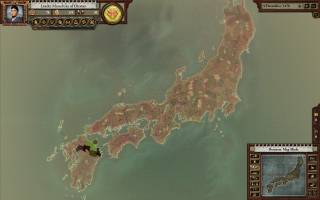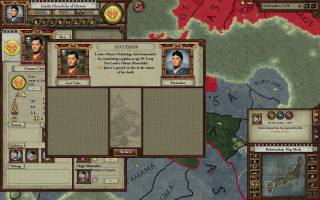Overview
 The colored area shows 2% of Japan; you need to control 50%
The colored area shows 2% of Japan; you need to control 50%Sengoku is the first standalone game in Paradox Interactive's long-running grand strategy line - which includes the likes of Crusader Kings and Europa Universalis - to focus on Asia; specifically Japan. Like Crusader Kings, Sengoku focuses more on managing a dynasty rather than a discrete country. The player takes the role of the leader of a clan, made up of various vassals, as they attempt to expand their territory either through diplomacy or war. The only victory condition of the game is to become Shogun of Japan. This is accomplished by gaining control of 50% of Japan, then holding that territory for three consecutive years.
Changes
While past Paradox strategy titles have sacrificed technical clarity in favor of detail and complexity, Paradox has taken strides to ensure Sengoku is their most polished and easy to navigate title at the time of its release. This has been accomplished by streamlining--and in some cases completely removing--certain elements from their previous strategy games.
Although Sengoku takes place in real-time, Sengoku is not to be mistaken for a Real-Time Strategy (or RTS) game. There is little unit micromanagement, and resource gathering is relatively laid back. Players can pause the game and browse screens of stats at their leisure. Sengoku is a historical/grand strategy title; a history simulator that does not demand the kind of strategizing titles like Starcraft or Supreme Commander require. Historically, very few Paradox strategy titles have victory conditions beyond gaining the most power and influence by a certain date. This is what differentiates Sengoku from many other Paradox titles.
Sengoku has a single clear-cut win state: become Shogun of Japan; as mentioned above, the game ends when a player controls 50% of Japan for 3 years; easier said than done, because every territory not within the 50% (and maybe some traitors within your territory!) will rise up against the would-be Shogun.
 Seppuku can be a last resort.
Seppuku can be a last resort.Bad Boy Points Replaced by Honour
The Badboy (BB) system is a feature used in many Paradox titles, such as Crusader Kings and Europa Universalis III; it is a deceptively important system, because although it is not featured directly on any stat screen, it is affected by a vast array of factors, most of which involve being a bad boy: declaring war unjustly, attempting an assassination and being caught, etc. The honour system diverges from the BB system, as it is featured as a resource, often earned through the expenditure of gold. Thus, it is an inversion of the BB system, and more comprehensively handled. In games like EU III, having a high BB rating would result in random countries frequently declaring war on you. In Sengoku, the system is more dynamic, and linked to the ways in which you comport yourself within that world. Pick a lot of fights? You'll probably see more clans itching to slip a wakizashi between your ribs during the low times. Concern yourself entirely with diplomacy and neglect your army? You'll appear as easy pickings for your rivals. Also important to note is that if at any time your honour falls below a certain threshold, players will be able to commit seppuku. This lets your current heir take the reins of the clan and continue on apace, although, seppuku is not an option if the current heir to your clan is not a part of your bloodline.
Characters
 Barely a fraction of the characters in the game.
Barely a fraction of the characters in the game.While Total War: Shogun 2 featured hostage exchange as a part of its diplomatic system, it is incorporated much more aggressively within Sengoku, with most clans offering hostage exchange as a traditional part of peace treaties. This system is relatively accurate. Leaders during the Sengoku period of Japanese history would exchange family members (typically children) with rivals to ensure that terms of an agreement or treaty were adhered to. This can become an interesting complication if your leader is relatively impotent (or not sexually mature themselves.) Furthermore, Sengoku allows the player to send mercenary ninja clans on a mission to retrieve hostages from rival clans.
It should be noted that Sengoku currently does not have the same amount of character interaction and events that are present in Crusader Kings. Paradox has already stated that they will continue to implement features in the months to come. One can only imagine that it's a matter of time before Sengoku's events system is fleshed out.
System Requirements
- Operating System: XP/Vista/Windows7
- Processor: Intel® Pentium® IV 2.4 GHz or AMD 3500+
- RAM Memory: 2 GB
- Hard Disk Space: 2 GB
- Video Card: NVIDIA® GeForce 8800 or ATI Radeon® X1900
- Sound Card: DirectX compatible
- DirectX®: DirectX 9.0c
Log in to comment